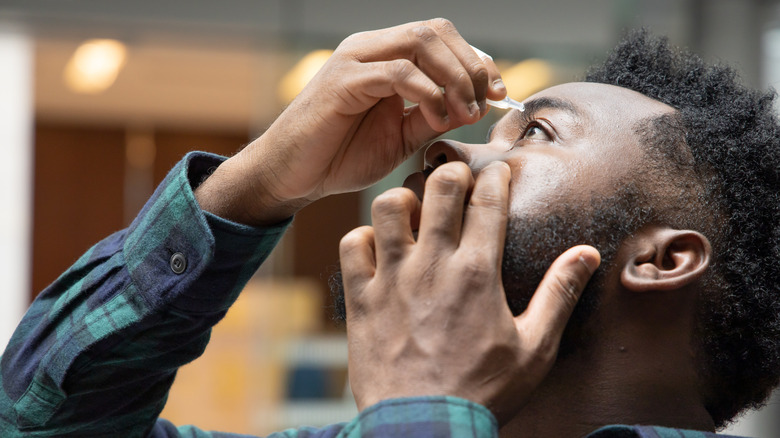The Surprising Reason Allergies Make Your Eyes Swell
Allergies are a seasonal curse. The wonder of spring can be lost in a sneezing fit because the air is full of pollen, or the beauty of summer ruined because a specific plant or tree comes into full bloom. And it's even worse if you're one of the unlucky people whose allergies aren't seasonal. Things like pet dander, dust, or mold can set off an allergic reaction at any time of year.
If you suffer from allergies, you know the signs and symptoms: sneezing, coughing, a little bit of wheezing. And, of course, itchy eyes that feel swollen and puffy even before you rub them.
The other symptoms all make intuitive sense. After all, you're breathing in an allergen, so it makes sense that your nose and respiratory system would react. It's a little less obvious why your eyes itch and swell. But really, they're just reacting in the same way as the rest of the body. Eyes are very sensitive and particularly vulnerable, and when they come in contact with an allergen or irritant, your body reacts by releasing histamines (via Asthma and Allergy Foundation of America).
Causes and treatment
The Cleveland Clinic explains that histamine is an essential chemical in the human body. Though it performs many different tasks, when it comes to allergies, histamine mostly causes inflammation and dilates blood vessels. This is why a sudden flood of histamine leads to swollen, itchy eyes.
It's a condition called allergic conjunctivitis. The Asthma and Allergy Foundation of America explains that the tissue inside our eyelids and on the outside of our eyeballs is called conjunctiva. Swelling is medically referred to using the suffix "-itis," so "allergic conjunctivitis" translates to "swelling in the tissue under the eyelid and on top of the eyeball because of allergies." It shouldn't be confused with general conjunctivitis, commonly known as pink eye.
Because allergic conjunctivitis is caused by a histamine reaction, it is fairly easy to treat with antihistamines, according to Johns Hopkins. These can be taken orally or as eye drops, and can be either purchased over the counter or issued through a prescription. Artificial tears or general eyes drops may also help, as they could rinse away irritants on the surface of your eyes. A cold compress against the eyes can reduce the swelling, and general allergic responses can be reduced by regularly washing your face and clothes, and avoiding allergen triggers whenever possible.


